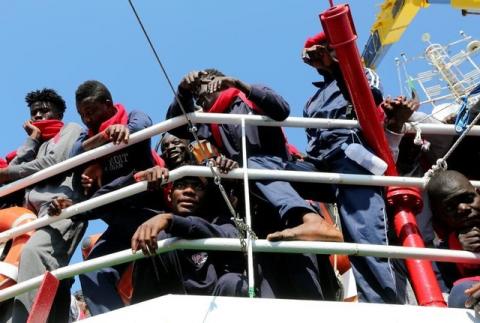Advertisement
EU offers plan, cash to stem Libya migrant flow to Italy
STRASBOURG (Reuters) - The EU executive offered Italy more funding on Tuesday to help control migration across the Mediterranean from Libya among a set of proposals responding to complaints from Rome that Europe was failing to help it out.
The plan agreed at the European Commissioners' weekly meeting will be put to national interior ministers on Thursday in Tallinn, where Italian officials want the other 27 EU governments to do more to help them deal with thousands of people arriving weekly. More than 85,000 have come this year.
The Commission plan calls for beefing up the Libya's coastal rescue services -- something Europeans hope may curb the number of people picked up close to shore by international charities.
European governments are concerned that such groups may be encouraging people to take to the sea in flimsy rafts because those rescued are ferried to Italy. Despite criticism of abuses by coastguards employed by Libya's shaky, U.N.-backed government, European officials argue that better local rescue services would mean more migrants being taken back to Libya.
"The focus of our efforts has to be on solidarity – with those fleeing war and persecution and with our Member States under the most pressure," Commission President Jean-Claude Juncker said in a statement.
"At the same time, we need to act, in support of Libya, to fight smugglers and enhance border control to reduce the number of people taking hazardous journeys to Europe."
The EU executive has an extra 35 million euros ($40 million) ready for Italy to help manage irregular immigration and renewed its readiness to mobilize EU agencies to help the Italians. It said a 46-million-euro project with Italy would bolster Libya's ability to make good on promises to help curb migrant traffic.
The EU also pledged to step up or otherwise enhance a range of other measures, including deportations of failed asylum-seekers, combat smuggling networks and fund African countries from which people are fleeing poverty hoping for work in Europe.
Italy, the Commission said, should draft a code of conduct for non-governmental organizations carrying out search and rescue operations in the Mediterranean, as well as speed up its processing of asylum claims and deportations of those rejected.
(Reporting by Alastair Macdonald in Brussels; Editing by Francesco Guarascio)



















Add new comment